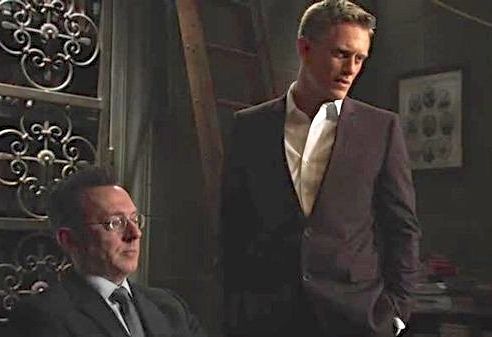Jennifer Crusie's Blog, page 233
May 2, 2016
Back in a minute . . .
I’m behind again, but will catch up soon.
In the meantime, here’s an interview about PoI with a picture of Bear.

The post Back in a minute . . . appeared first on Argh Ink.

May 1, 2016
Sunday Notes
First, thank you all very much for the kinds words about Wolfie. As Krissie said, he’ll live forever in Dogs and Goddesses and Faking It, so that’s something.

So I’ve been thinking about the Argh Ink Book Club, and I think we should give it a shot, see how it goes. I like the idea of putting up three posts on the same day, discussing characters, plot, and the story as a unified whole, keeping all the discussions going at once, but sorted out a little so things don’t get quite so confusing.
How does that sound? Too regimented? Would a single post be better? Do you want questions ahead of time? Should I post them the day the discussion starts? No questions at all, we’ll just talk about whatever we want? I’m open.
Oh, except on the book we’re doing. That’s Going Postal by Terry Pratchett.

So here’s your one-month-ahead-of-time head’s up. June 6, we’re gonna talk about how Moist raised the Ankh Morpork postal service from the dead while saving the Discworld version of the interwebs. A hero for our time. Anti-hero. Semi-anti-hero. Whatever.
And then in other news, io9 has an interview with the PoI showrunners, and it sounds like Season Four is gonna be grim. Those of you who decided to leave because it was getting too dark? Probably a good decision:
“We’ve never shied from killing off our characters, and this season is no different,” Nolan said. “Our team does not make it out intact.” In fact, he says that depending on how you reckon who’s a “series regular,” you could say that a majority of the regulars are dead by the end of the season. “We’re equal-opportunity killers.”
Great. Greer’s a series regular, right? We could spare him. Fusco and Bear better make it, though. (The showrunners have promised that Bear does not die, but you know showrunners.)
And then there’s my research:
“The average height and weight of women varies around the world, but in the United States in 2010, the average adult female height was 63.8 inches (approximately 5 feet 4 inches) and 166.2 pounds, according to the Centers for Disease Control and Prevention.Oct 27, 2015.”
I had a line about Nita being medium height and weight, and I was aiming for about 5’8″, 140 pounds, so I’m a little off. Should I go for “tall” instead of medium height? I don’t want to be too specific, although her weight is going to be part of a plot point later (not as in “fat or thin,” but more of a mechanical thing), so I’ll probably be specifying 140 then.
And now, your moment of WiP. (I have more of this, but it’s in even worse shape than the stuff I’m posting.)
The post Sunday Notes appeared first on Argh Ink.

April 30, 2016
Cherry Saturday 4-30-2016
Today is National Honesty Day.

Really, it’s so much simpler.
The post Cherry Saturday 4-30-2016 appeared first on Argh Ink.

April 29, 2016
Wolfgang Smith, A Good Dog and True: 2001-2016

Wolfie was born in a &%^$*&^ puppy mill which is why he had such extreme parrot mouth and looked like a very small, deranged wolf. He was shipped to a pet store where some idiot bought him and then returned him. Then somebody else bought him, and then they gave him to somebody else. I picked him up to take him to Dachshund Rescue as a courier and then refused to hand him over, so I was his fourth owner before he was a year old. We were together for the next fourteen years, through moves to Columbus, two moves in Cincinnati, and one move to New Jersey. He was generally an easy-going dog, aside from the occasional bouts of vamp-face snarling that tapered off as he got older. He had issues. Who doesn’t?
He was the model for Steve in Faking It, and appeared as himself with new puppy Milton in Dogs and Goddesses. I’m sure he’s now chasing squirrels in dog heaven (he always got along with cats), free of the arthritis, blindness, deafness, heart murmur, leg tumor, and other ailments that brought him down in the end.
He is survived by his foster brother, Milton, his foster sisters, Mona and Veronica, and that woman who kept feeding him.
He was a good dog and true, and he will be very much missed.
The post Wolfgang Smith, A Good Dog and True: 2001-2016 appeared first on Argh Ink.

April 28, 2016
Person of Interest: Deus Ex Machina: Act Climax As Crisis
One of the conceits I’ve been working with here is that Person of Interest is a five act novel, each season finale acting as a turning point, an event that swings the story in a new direction, raising the stakes, changing character, and escalating the conflict by hurtling the plot forward. If you prefer a classic screenplay structure, then Season One is Act One and the upcoming Season Five is Act Three, leaving the middle three seasons as the arcing middle act with the devastation of Carter’s death hitting at the midpoint/point of no return.
But act/turning point designations don’t have to fall into a rigid pattern. They’re there to make sure that a long form story keeps reinventing itself, not to make a fill-in-the-blanks framework for story. So I’d argue that there are two crisis points in the Person of Interest novel: this episode which defeats the Gang, and the climax of Season Four, which defeats the Machine, a one-two punch that sets up the desperate final act, which begins next Tuesday (May 3), a shortened stretch of narrative that raises the reader/viewer’s anxiety about the story to a fever pitch before providing catharsis in a final story-changing climax.
Well, I’m worried, anyway. Those PoI writers will kill anybody.
Previously on Person of Interest:
“Root Path:” PoI gets back to what it does best: developing character and saving people. In this case, it’s Root, now part of the Gang, who crosses paths with somebody whose life she ruined back when she was a master criminal. The overwhelming guilt she feels is evidence on the page/screen that the Machine has changed her. Also, Decima gets a chip it really shouldn’t have, so while the number gets saved, the world is now in jeopardy.
“Allegiance:” The number of the week is being targeted by terrorists because she’s fighting to get a good man out of government custody and corrupt government officials are trying to silence her. it’s a good number of the week story, and underneath that it’s a Decima story since the whole clusterfuck is caused by Decima getting generators into the country for its nefarious plans. The Machine sends Root and Bear after Decima, and Greer, Decima’s Darth Vader, offers her a job on their team. Root says no, now firmly part of the Gang, but she and the Machine recognize they’re up against something huge and powerful and kinda creepy.
“Most Likely To:” You know those episodes where the writers send the cast to a high school reunion and they have to pretend they used to be students there? Yeah, this is one of those. But it’s good, plus the number hits on Shaw and that’s always amusing, and the subplot with Finch and Fusco sharing a hotel room in DC is worth watching on its own. Also Vigilance tries to kill everybody and then outs the Machine so the government has to deny its existence and shut it down, leaving an opening for Decima to weasel their own AI in (that would be Arthur’s Samaritan).
“Death Benefits:” The number this week is a corrupt senator; the reversal is that the Machine seems to want the Gang to kill him. In hindsight, this was a good call on the Machine’s part, but Finch objects and leaves, and Reese and Shaw just aren’t the assassins they used to be. Root’s traveling around working for the Machine, so the senator gets to live, and he takes the bribe to get Samaritan into the government with Control heading everything up again. They shoulda shot the senator.
“Beta:” The number is Grace, the love of Finch’s life, who’s kidnapped by Decima. Finch trades himself for her, and at the end of the episode, he’s in Greer’s hands.
“A House Divided:” FLASHBACKS. Sweet Jesus, the flashbacks and they’re all about Collier, the murderous bastard in charge of Vigilance, showing how he got to be a murderous bastard. I don’t care. He’s a zealot who kills people, so screw him. Then he kidnaps Greer and a senator and Control and Finch and several others and sets up a mock trial to be broadcast so the world can see how corrupt everybody is, which would be an admirable goal if he’d quit killing people.
Which brings us to the major turning point that is the Season Three finale: “Deus Ex Machina.”

So this is our first crisis turning point, the place where all is lost and our protagonists (except for the Machine) are beaten: Decima turns out to be the worst of all possible antagonists, headed by Greer, a man so crazed by betrayal that he has decided to give the world over to the control of machines, in fact, one machine in particular, Arthur’s Samaritan. Samaritan is the stepbrother to Finch’s Machine except that Finch’s Machine was programmed with failsafes; Samaritan is just pure AI. That means if Samaritan sees a threat, it will act to remove it, even if it involves killing innocents. “Innocent” has no relevance; it’s all about the Greater Good, and we know how that always works out. Greer is to Decima what Pierce was to Zola’s Hydra computer program: the power behind the implementation, both determined to wipe out opposition to world peace, as they define “world peace.”
So the big reveal at the end is that all the work Root has been feverishly doing with the Cartagena Three hasn’t been to defeat Decima and Samaritan at all; that battle has been lost since the Gang wimped out on killing the senator. What Root is doing is removing Finch, Reese, Shaw, herself and the three computer geeks from Samaritan’s sight: it thinks they’re all irrelevant, and its code tells it to disregard them. That’s the best that Root can do–worse, it’s the best the MACHINE can do–to defeat Samaritan in its attempts to wipe out all opposition. And that leads to final scene when Finch and Collier learn that Decima was far, far ahead of them, that the trial has not been broadcast to the country because Decima owns the TV station, that Vigilance was actually created as an unwitting arm of Decima, doing its bidding even while the group thought they were striking a blow for liberty, and that now that Samaritan has taken over the government’s feeds, they’re irrelevant. So Samaritan destroys them, Finch narrowly escaping death because the Machine is fighting a desperate rear guard action (and because Hersh ends up a hero; who’d have ever thought we’d mourn him?).
A good crisis turning point puts the protagonist completely on her knees, bruised, bleeding, defeated, and that’s where this finale leaves Our Gang. It destroys everything that came before–we’ll never go back to the library again–and forces the Gang to reinvent themselves as they realize the enormity of the threat that has just taken over the country. After this, everything is new again, and it’s terrifying.
As I mentioned before, one part of the gang who’s not defeated, though, is the Machine. She’s still going strong, watching the Gang’s back. To get to the Crisis point where they AND the Machine are done, you’re going to have to stick around for the Season Four finale.
So what does a crisis do, besides destroy the hopes and dreams of your protagonist?
It’s like a forest fire: it’s devastating, but it clears the underbrush to allow room for new growth. After three years, the Machine Gang had evolved into a group so efficient they were almost omniscient, but the enemies they were battling had also grown–the secret branch of government, Vigilance, Decima–so that the story was resting atop so much detail and history and convoluted master planning that it was imprisoned by its own past. This crisis point burns away all of that: Vigilance is destroyed and Decima and Samaritan have infiltrated the government and fused into one super-powerful antagonist, achieving the goal the Gang spent an entire season trying to block. It’s not just that the Gang failed, it’s that their community has taken a body blow, its members scattered, its base invaded, its enemy everywhere. There’s a reason that the crisis point in a story is often called the Dark Moment: the lights have gone out on the story, and the protagonist is down for the count.
The protagonist gets up again, of course. This isn’t the climax, it’s the devastation before the climax. It’s the burning away, not just of plot but of character barriers. Whatever line your protagonist had in the past that she or he would not cross, it’s gone up in smoke with everything else as she or he (or in the case of PoI, they) march irrevocably toward that last big showdown with the antagonist, no holds barred.
If you think Season Three was tough, wait’ll you get a load of Season Four.

Weakest Parts
• Fucking flashbacks that once again are completely unnecessary, taking story time away from the people we care about who truly are in desperate circumstances. ARRRRRRRRRRRRRRRGH.
• The weight of an incredibly complex and convoluted story drags this down, especially the long Vigilance rants. Collier is a misguided, homicidal loon, drunk on power and purpose, but he’s standing beside Greer, who’s calmly handing the world over to a machine because he’s given up on humanity. A little less ranting and a little more direct action would have helped here, although I may think that because I arrived at the “just shoot him already” stage about the time he shot Sloan.
Smart Story Moves
• Balancing the tense but static courtroom scenes with the odd-couples-in-action: Reese and Hersh rousting Vigilance to find the courtroom, and Root and Shaw planting the corrupted computers in the heart of Decima.
• Greer delivering the death blow, literally and figuratively, to Vigilance. I still hate Collier, but that is a devastating revelation.
• Greer’s final act of terrorism, wiping out witnesses and ensuring that the government will turn to Samaritan. Greer may be evil, but he’s efficient evil.
Favorite Moments
• Shaw, Hersh, and Reese walking through the blackout like pals, especially Hersh taking a bike at gunpoint so Shaw can go rescue Root.
• “What Machine?” “What trial?” Fucso, safely out of the know.
• Shaw showing up to save Root. SHOOT!
• “I tried to quit, but some jackass told me I needed a purpose.”
Horrible Moment:
• Leaving the library for the last time, then watching it get ransacked by Decima’s jackbooted thugs.
• Decima and Samaritan wiping out the Vigilance people who would fight back.
• The Gang splitting up.
Ominous Moment
• “The time has come for your god and mine to do battle.”
• “This was never about turning it off.” “This was never about winning. This was just about surviving.”
• Samaritan coming online: “Let there be life.”
• “The question is what, my dear Samaritan, are your commands for us?”
Basically the last 15 minutes.
Big Machine Moment:
• Telling Finch to hope.
Next week: The beginning of Season Four (and in real life, the start of Season Five which I understand starts with a flash forward so expect whining from me):
May 2: 4-1 Panopticon (Erik Mountain and Greg Plageman): Rebooting a Story After a Turning Point
May 3: 4-3 Wingman (Amanda Segel): Multi-Thread Plotting
May 4: 4- 11 If/Then/Else (Denise The): Point of View as Meaning
The post Person of Interest: Deus Ex Machina: Act Climax As Crisis appeared first on Argh Ink.

April 27, 2016
Lavender: Action is Character
This was going to be a comment in answer to the comments on yesterday’s post, but it got long, so . . .
I have to go back through and reply to everybody (I’m just checking dashboard this AM), but there are two things I’m finding interesting about people requesting that Lavender be spared because they like her:
One is the reinforcement for the idea that action is character. Lavender does everything right, that’s why Liz likes her, and her actions are what everybody here is citing.
But the other is the complete failure of another method of characterization, what other characters say about the character.
Generally speaking if somebody we like doesn’t like a character, we don’t like that character or at least hold her in suspicion. But except for one person yesterday, nobody is giving any credence to the fact that Molly says emphatically that Liz is not like Lavender and in the diner scene compares her to Ann Coulter (apologies if you like Ann Coulter) obviously someone she finds lacking. And then there’s the weight of numbers: Patsy Porter is nuts, but Kitty isn’t, and she does not like Lavender; Cash’s brothers don’t like Lavender although they wisely stay out of it;l Lavender’s sister, Skye, drops out of her wedding; and I forget what Liz’s mother says, but she’s not a fan although she’s mild about it.
Unless all of those people are nuts (and some are), there’s something wrong with Lavender. And I think there are subtle examples of this on the page. For instance, Lavender’s the kind of person who would ask her groom’s ex-girlfriend to be her maid of honor the day before her wedding so that she can show the town that she’s won and her groom doesn’t love Liz any more. She’s the kind of person who knows that Peri is in danger (she took the keys from Margot) and uses that as a bargaining chip instead of getting Margot help. She’s the kind of person who will say, “All these people hate me,” without acknowledging why; that is, she’s a smart woman, she knows why each of those people dislike her, but she plays it as . . . actually, she doesn’t play it. She just says, “They hate me, you can see it,” and uses it on Liz, who also feels everybody dislikes her. She really plays Liz all the way through the first act.
Clearly I have to get more clues on the page before Lavender hits her Big Moment and kicks all that seething resentment into overdrive so that at least six people have motive to murder her, but it’s educational knowing that Action is Character is going to trump everything else (which makes sense, it’s more powerful that everything else).

Here’s the placeholder pic for Lavender. A placeholder, for those of you new to my fractured process, is a picture that doesn’t look like the character–it’s not an illustration–but it captures for me the personality of the character. It’s why I usually have more than one person as a placeholder in the collages; it’s layering different aspects of character to make a more complex whole.

But one of the reasons I chose these two is that there’s a vague resemblance between Liz and Lavender, not enough that people would remark on it, but enough that Cash’s taste in women becomes clear and another reason why Lavender would want Liz up there with her; they look alike, but Lavender is the classic beauty. And then, of course, that becomes a plot point, and Lavender becomes a foil for Liz for the rest of the book: Liz is like her in many ways, very different in others, and having the murder victim as a foil is helpful in plotting the rest of the book (assuming I ever write it). (And I have to admit, I like it that the first picture leans toward warm tones and the second picture leans toward cool.)
All of which is to say, yesterday’s comments were hugely helpful. I clearly need to do some rewriting because I failed utterly to make most readers uneasy about Lavender, so once again, thank you very much, Argh Beta Readers.
The post Lavender: Action is Character appeared first on Argh Ink.

April 26, 2016
Thank You!
 I surrender to destiny my beta readers.
I surrender to destiny my beta readers.
Thank you, thank you, thank you. The comments on the WiP are gold, and since they’re here on the blog, I can find them if and when I ever finish Liz. (I think I started her in 2008?) And having looked over all of them, I think you’re all absolutely right (except Lavender dies).
So much of early drafts like these is just getting stuff on the page, trying to cover everything you need to set-up the story while moving the story, two things that are antithetical to each other which is why there’s so much infodump and back story in first drafts of first acts and why so many authors resort to prologues (NO PROLOGUES). I think that even though these are not raw first drafts, that’s still where a lot of the problem in this draft comes in (example: Belinda). I also think it’s easy to assume things about your character that aren’t coming across at all (like Liz as a fixer). And sometimes you just shove the plot where you need it to go and forget it actually has to make sense on the page (nobody believing Liz wouldn’t leave is a big one here; I did not see that criticism coming, but it’s clearly a problem). This is why beta readers are so important.

The first time you read through beta comments, the urge to explain is overwhelming. “No, Lavender has to die because . . .” Explaining, however, is something you cannot do because it has to be on the page. So the other great thing about this kind of feedback is that you can see expectation. I wanted Liz to like Lavender, wanted her to feel a kinship with her, as a set-up for things that are going to happen later, so finding out that Lee didn’t want her to die was a good sign (sorry, Lee). I did want people to like Molly, Anemone, Jill, and Cash, and really like Vince, setting up that romance (if people start picking Cash, my romance plot is screwed). So while showing partial drafts to people is not a good thing in general, showing beta readers a first act can be a course correction; you really don’t want your mistakes set in stone.

All of which is to say, thank you. If I ever finish this, you’ll see changes made because of the comments you’ve given me.
You’ll also see the “RAM” post for PoI up, but only after I rewrite it because I got to the end and thought, “No, that’s not right.” So rewrites on that, too. Writing is rewriting, people. Sigh.
ETA: This is my placeholder for Liz . . .

The post Thank You! appeared first on Argh Ink.

April 25, 2016
Person of Interest: RAM: There Is No Good Back Story
When I chose the episode and craft topics, I did it by memory. As a fan of the series, I loved “RAM, so I thought it’d be a good way to talk about good back story;” watching it now as a writer, it’s still an excellent story on its own (another written by Denise The), but in the context of the series as a whole, it has two main purposes: explain what happened in the past and provide fan service. The problem is, while it’s fun to know what was happening to Finch and Reese before they joined forces (even more fun to see Shaw at her murderous best), there is nothing in the story that we needed to know. It’s a good episode, but if you were editing the season as a novel, this episode would go. Back story kills, people, no matter how well it’s written.
Previously on Person of Interest:
“Provenance:” A rare meh episode, completely forgettable except for Reese pouring a glass for the absent Carter at the end celebration.
“Last Call:” An episode about a mysterious man who calls a 911 operator and threatens to kill a kidnapped child unless she deletes a call number from the main computer. A good number episode with the loose end of the bad guy who threatens Finch at the end and then never reappears in the series (so far), unlike Root who did the same thing and then came back with a vengeance. (Analysis of plot and subplot made at the time the episode first aired is here.)
And then there’s “RAM.”

To recap, “RAM” is a good solid story and outstanding fan service, but it’s also good example of how back story can suck writers out of the story they’re writing and into outer darkness (aka not-the-story).
Here’s the thing about back story: It’s not the story. It’s the stuff that happens before the story. The reader/viewer wants the story, so anything that gets in the way of the forward progression of that story had better be fantastic, which most flashbacks and discussions of the past are not.
Here’s the other thing about back story: If you need to tell it to make your real story make sense, you may have lost your grip on your real story. It’s Occam’s Razor again: given two choices, the simpler one is the best. One of the great things about Person of Interest is also one of its problems: Every season gets higher stakes with more sophisticated and complex antagonists, so every season gets more complex, which brings in more convoluted back story, which . . .

Which brings us to that damn laptop that almost got Kara Stanton and Reese killed in China before there was a Machine Gang.
That sentence alone should tell you everything you need to know about toxic back story. Kara Stanton is not part of the ongoing story in the Now (although she did come back working for Decima, she got blown up when . . . never mind). The story in the now does not take place in China. The laptop is not part of the story in the now. (It was when the virus activated the code that Finch typed into it that enabled it to set itself free, but that was last season; we rolled with that just fine without the back story then.) Which means that everything in this episode is there to show how the laptop got to China, which we don’t care about.

Having gotten that off my chest, I will say this: one way to make back story not annoying is to make it the story in the now about people we care about like the good Daniel Casey who’s Finch’s doppelganger with just as many people trying to kill him. Because the whole story is about Daniel in the now of this episode, it’s not a bunch of annoying interruptions; in fact it’s one of the few PoI episodes NOT interruped by flashbacks. It’s also excellent fan service because it shows Finch with the guy who was Reese before Reese showed up, and it shows Reese losing his taste for the work he’s doing while unknowingly showing Finch the kind of man he is, which will lead Finch to offer him a job when he hits bottom. It’s as if Leverage had done an episode showing Nate and Sophie back when his insurance investigator was chasing her art thief around Europe. Wouldn’t that have been fun? You know why they never did that episode? Because it wasn’t the story.
Sorry. Back story always has this effect on me.
Weakest Parts
The fact that it’s a giant flashback.
Smart Story Moves
• Making Reese the threat. It pulls the narrative closer to the ongoing series story. Before Reese and Stanton show up, this is just Scenes from Finch’s Past.
• Showing Decima acting aggressively very early, again tying to the main story.
• Showing how FInch corrupted the code to thwart Decima years later.
• Root showing up at the end and sending Casey to Cartagena to meet Greenfield, pulling it all together.
Favorite Moments
• Finch and Casey bonding, two socially awkward nice-guy computer geniuses
• Shaw coming in at the end. It’s always good to see Shaw.
Ominous Moment
“We have a mutual friend. And right now, she needs your help.” Root is always ominous, even when she’s smiling from inside a furry Nanook of the North hood.
Tomorrow:
“Deus Ex Machina,” the Season Three Finale. Talk about your ominous moment.
Next Week’s PoI Posts:
May 2: 4-1 Panopticon (Erik Mountain and Greg Plageman): Rebooting a Story After a Turning Point
May 3: 4-3 Wingman (Amanda Segel): Multi-Thread Plotting
May 4: 4- 11 If/Then/Else (Denise The): Point of View as Meaning (YAY!)
The post Person of Interest: RAM: There Is No Good Back Story appeared first on Argh Ink.

April 24, 2016
Sunday Notes
So I’ve been working (which you probably noticed since the PoI posts were late) and trying really hard to remember this:

because this book is not inside my comfort zone at all.
On the other hand, when I look at it, it’s pretty much basic Crusie: an angry, pro-active heroine, a laidback hero, lots of food, a community of thousands, a dog . . . I do have a groove I stick to. And maybe making the hero the Devil is a way of keeping the groove from becoming a rut. I really don’t want to be an author who writes the same book over and over, even though there are authors who do that I really admire.
So I’m concentrating on saying, “Yes,” every time something outrageous pops up and I think, “No.” “No, that’s a bridge too far, no that’s too ridiculous, no that’s too trope-y.” Fuck it. Yes.
Here, have another massive chunk of WiP while I go work on The Adventures of Nita and the Devil on Demon Island. Massive as in “It’s the first act and it’s over 40,000 words and it can’t be much over 30,000 so let me know what parts can be cut, please.”
The post Sunday Notes appeared first on Argh Ink.






